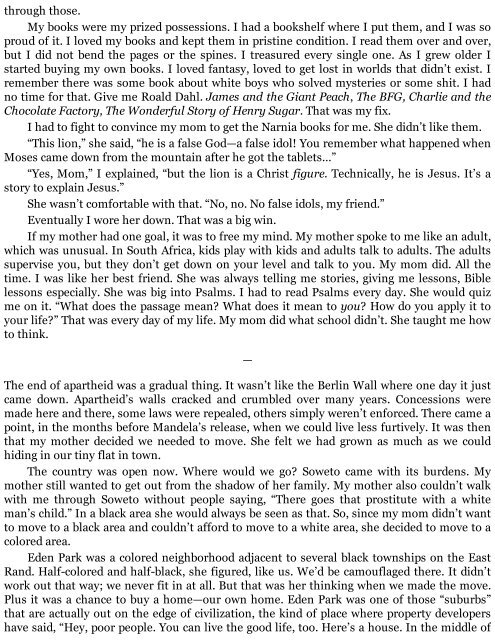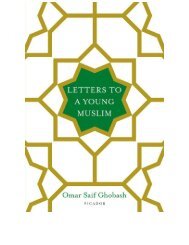You also want an ePaper? Increase the reach of your titles
YUMPU automatically turns print PDFs into web optimized ePapers that Google loves.
through those.<br />
My books were my prized possessions. I had a bookshelf where I put them, and I was so<br />
proud of it. I loved my books and kept them in pristine condition. I read them over and over,<br />
but I did not bend the pages or the spines. I treasured every single one. As I grew older I<br />
started buying my own books. I loved fantasy, loved to get lost in worlds that didn’t exist. I<br />
remember there was some book about white boys who solved mysteries or some shit. I had<br />
no time for that. Give me Roald Dahl. James and the Giant Peach, The BFG, Charlie and the<br />
Chocolate Factory, The Wonderful Story of Henry Sugar. That was my fix.<br />
I had to fight to convince my mom to get the Narnia books for me. She didn’t like them.<br />
“This lion,” she said, “he is a false God—a false idol! You remember what happened when<br />
Moses came down from the mountain after he got the tablets…”<br />
“Yes, Mom,” I explained, “but the lion is a Christ figure. Technically, he is Jesus. It’s a<br />
story to explain Jesus.”<br />
She wasn’t comfortable with that. “No, no. No false idols, my friend.”<br />
Eventually I wore her down. That was a big win.<br />
If my mother had one goal, it was to free my mind. My mother spoke to me like an adult,<br />
which was unusual. In South Africa, kids play with kids and adults talk to adults. The adults<br />
supervise you, but they don’t get down on your level and talk to you. My mom did. All the<br />
time. I was like her best friend. She was always telling me stories, giving me lessons, Bible<br />
lessons especially. She was big into Psalms. I had to read Psalms every day. She would quiz<br />
me on it. “What does the passage mean? What does it mean to you? How do you apply it to<br />
your life?” That was every day of my life. My mom did what school didn’t. She taught me how<br />
to think.<br />
—<br />
The end of apartheid was a gradual thing. It wasn’t like the Berlin Wall where one day it just<br />
came down. Apartheid’s walls cracked and crumbled over many years. Concessions were<br />
made here and there, some laws were repealed, others simply weren’t enforced. There came a<br />
point, in the months before Mandela’s release, when we could live less furtively. It was then<br />
that my mother decided we needed to move. She felt we had grown as much as we could<br />
hiding in our tiny flat in town.<br />
The country was open now. Where would we go? Soweto came with its burdens. My<br />
mother still wanted to get out from the shadow of her family. My mother also couldn’t walk<br />
with me through Soweto without people saying, “There goes that prostitute with a white<br />
man’s child.” In a black area she would always be seen as that. So, since my mom didn’t want<br />
to move to a black area and couldn’t afford to move to a white area, she decided to move to a<br />
colored area.<br />
Eden Park was a colored neighborhood adjacent to several black townships on the East<br />
Rand. Half-colored and half-black, she figured, like us. We’d be camouflaged there. It didn’t<br />
work out that way; we never fit in at all. But that was her thinking when we made the move.<br />
Plus it was a chance to buy a home—our own home. Eden Park was one of those “suburbs”<br />
that are actually out on the edge of civilization, the kind of place where property developers<br />
have said, “Hey, poor people. You can live the good life, too. Here’s a house. In the middle of
















